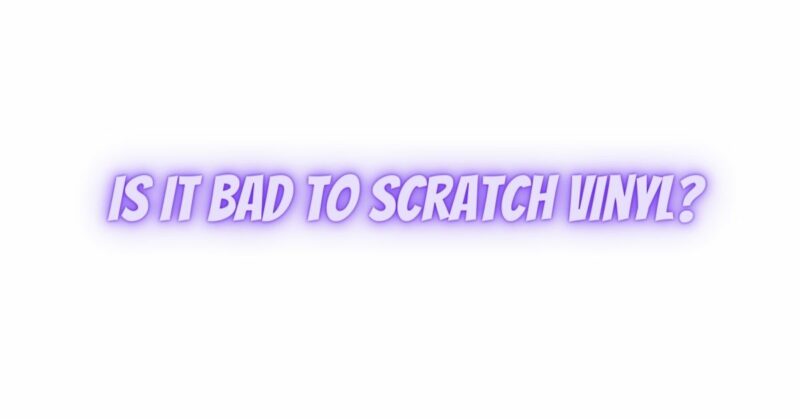Vinyl records have enjoyed a resurgence in popularity in recent years, thanks to their warm analog sound and tactile appeal. However, vinyl records are also delicate and susceptible to damage, including scratches. In this comprehensive analysis, we’ll explore whether it’s bad to scratch vinyl records, the potential consequences of scratching, how to prevent scratching, and what to do if your records become scratched.
The Vulnerability of Vinyl Records
Vinyl records are made of a plastic material called polyvinyl chloride (PVC) and feature grooves that contain the audio information. The stylus (needle) of a turntable’s tonearm follows these grooves to reproduce the music. Due to the nature of vinyl, they are inherently susceptible to damage, especially from physical contact.
Consequences of Scratching Vinyl Records
Scratches on vinyl records can lead to various negative consequences, including:
- Audible Noise: Scratches produce audible noise in the form of pops, clicks, and crackles. These noises can detract from the listening experience and diminish sound quality.
- Tracking Issues: Deep or severe scratches can cause tracking issues, where the stylus has difficulty following the grooves properly. This may result in skips or jumps during playback.
- Damage to Stylus: Scratches can cause premature wear and damage to the stylus (needle) of your turntable. The sharp edges of scratches can lead to stylus damage and impact the overall performance of the turntable.
- Loss of Fidelity: As scratches disrupt the smooth flow of the stylus along the grooves, they can lead to a loss of audio fidelity. The music may sound distorted or lack clarity.
- Permanent Groove Damage: In some cases, deep scratches can cause permanent damage to the vinyl grooves themselves, making it impossible to enjoy certain sections of a record.
- Reduced Value: Scratched records typically have reduced value, especially among collectors. Severe scratches can render a record unplayable and less desirable to collectors.
How to Prevent Scratching Vinyl Records
Preventing scratches on vinyl records is essential to preserving their quality and value. Here are comprehensive tips to help you prevent scratching:
- Handle Records Carefully: Always handle records by the edges to minimize contact with the grooves. Avoid touching the playing surface with your fingers.
- Clean Records Before Playback: Use a carbon-fiber brush or antistatic brush to remove dust and debris from records before playing them. Clean records are less likely to transfer contaminants to the stylus.
- Keep Turntable Clean: Regularly clean your turntable’s platter and tonearm to prevent dust and debris from accumulating and transferring to records.
- Use a Quality Stylus: Ensure that your turntable’s stylus is in good condition and properly aligned. A well-maintained stylus is less likely to cause damage.
- Protective Sleeves: Store records in protective inner sleeves to prevent scratches from dust and debris. Outer sleeves can also protect records from physical damage.
- Store Vertically: Store records vertically to prevent warping and minimize the risk of scratches from stacking.
- Avoid Poor Quality Record Players: Cheap or poorly designed turntables can contribute to stylus wear and scratching. Invest in a quality turntable.
What to Do if Your Records Are Scratched
If your vinyl records become scratched, you can take the following steps:
- Inspect the Damage: Examine the record under a good light source to assess the severity of the scratches.
- Use a Cleaning Solution: Some mild scratches can be minimized with a vinyl record cleaning solution and a soft brush. Gently clean the record in a circular motion. Rinse and dry the record thoroughly.
- Consider Professional Cleaning: For valuable or severely scratched records, consider professional cleaning and restoration services.
- Replace the Stylus: If the stylus is damaged due to scratched records, consider replacing it to prevent further damage to your records.
- Digitize Scratched Records: If a scratched record is still playable, consider digitizing it to preserve the music digitally.
Conclusion
While vinyl records are cherished for their analog warmth and unique listening experience, they are vulnerable to damage, including scratching. Scratches can lead to audible noise, tracking issues, and reduced fidelity. To prevent scratching, handle records carefully, keep your turntable and records clean, and invest in a quality stylus. If your records do become scratched, take prompt action to assess the damage and, if necessary, seek professional help to restore their playability. Proper care and maintenance will ensure that your vinyl collection remains in excellent condition for years to come.


